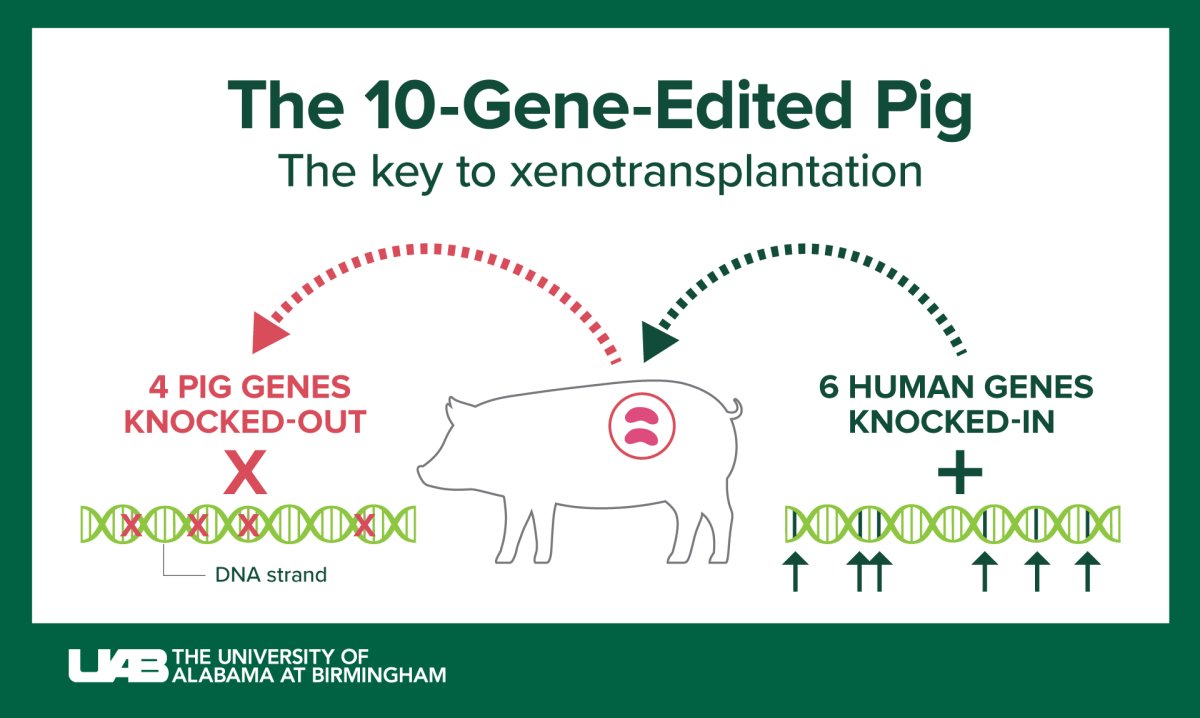Pig kidneys transplanted into a human have worked to preserve life in a breakthrough case.
The genetically modified kidneys were transplanted into a brain-dead patient and were found to function just like human kidneys over the course of a seven-day study.
This is not the first time that pig kidneys have been transplanted into a human, with two cases reported last year, but it is the first time the kidneys have performed life-sustaining kidney function, according to a paper published in the journal JAMA Surgery.
Its authors say it showcases animal organ transplantation as "a viable potential solution to an organ shortage crisis responsible for thousands of preventable deaths annually."

The paper's lead author, Dr. Jayme Locke, told Newsweek: "This is the first time life-sustaining kidney function has ever been demonstrated in a human. The first two published reports demonstrated urine output but not creatinine clearance."
Kidneys filter the blood, removing toxins and waste products such as creatinine from the body. They also remove extra fluid, which they turn into urine. Kidneys are essential for balancing the internal environment of the body.
In the new study, the transplanted kidneys began making urine within four minutes, producing several liters in the first 24 hours, and successfully cleared creatinine—a waste product produced by muscle wear and tear—from the blood.

The pig kidneys were genetically modified to help the process of xenotransplantation—cross-species transplant—minimizing the risks of the human body rejecting the foreign organs.
"Our pigs have 10 genetic edits. Four genes are knocked out: three to prevent hyperacute rejection, one to prevent kidney growth," said Locke, director of the University of Alabama at Birmingham's Comprehensive Transplant Institute at the Heersink School of Medicine.
"Six human transgenes have been inserted to help modulate the human immune system. These edits have allowed us to perform successful xenotransplants using standard immunosuppression—currently used in human-to-human allotransplantation and FDA-approved."
She added: "This is really important as the pre-clinical work using the non-human primate model has historically used non-FDA-approved immunosuppressants."

The study may pave the way for a future where animal organs can be used to treat people with kidney failure.
"Organs from animals have long been considered as a way of solving problems with donor shortage. But this raises many difficulties. First is the issue of whether or not animal physiology is close enough to humans for transplanted organs to function appropriately," Daniel M. Davis, head of life sciences and professor of immunology at Imperial College London, told Newsweek.
"Here, amazingly, a pig kidney happens to be similar in size and anatomy to a human one. But then there's the immune problem: animal cells are clearly going to be seen as something alien to the normal components of the human body and can be attacked by the immune system. For example, pig cells contain a particular type of sugar molecule which is not found in humans.
"As a way round that problem, the pigs were engineered to look more human on a molecular scale and also to express molecules which dampen immune responses. This is why the pig used here has 10 genetic alterations, mainly to prevent an attack from the human immune system."
Around 37 million Americans have kidney disease, which kills more people each year than breast or prostate cancer, according to the National Institute of Diabetes and Digestive and Kidney Diseases.
Kidney transplants can save a patient, but there is a shortage of organs. Around 90,000 people are on the kidney transplant list, while only 25,000 transplants are performed in the U.S. each year. People often wait several years for a kidney: 40 percent of patients die within five years while waiting for a kidney transplant.

Locke and her co-authors hope to continue their research with the "Parsons Model"—a pre-clinical model with a brain-dead person, named after organ donor Jim Parsons—and also move on to transplantation into living patients. They will need authorization from the Federal Drug Administration to do this.
"We are anxious to move into a phase I clinical trial in living persons. We need an [Investigational New Drug application] from the FDA to do this. We are working toward that goal now," Locke said.
Davis said the research was "extremely exciting," but cautioned that it was in its "early stages."
He added: "We now know that a genetically modified animal can be used to replace a human kidney and work for one week. But we need it to work for more than one week, and this is just one test case for now."
Do you have a tip on a science story that Newsweek should be covering? Do you have a question about xenotransplantation? Let us know via science@newsweek.com.
Uncommon Knowledge
Newsweek is committed to challenging conventional wisdom and finding connections in the search for common ground.
Newsweek is committed to challenging conventional wisdom and finding connections in the search for common ground.
About the writer
Jess Thomson is a Newsweek Science Reporter based in London UK. Her focus is reporting on science, technology and healthcare. ... Read more





